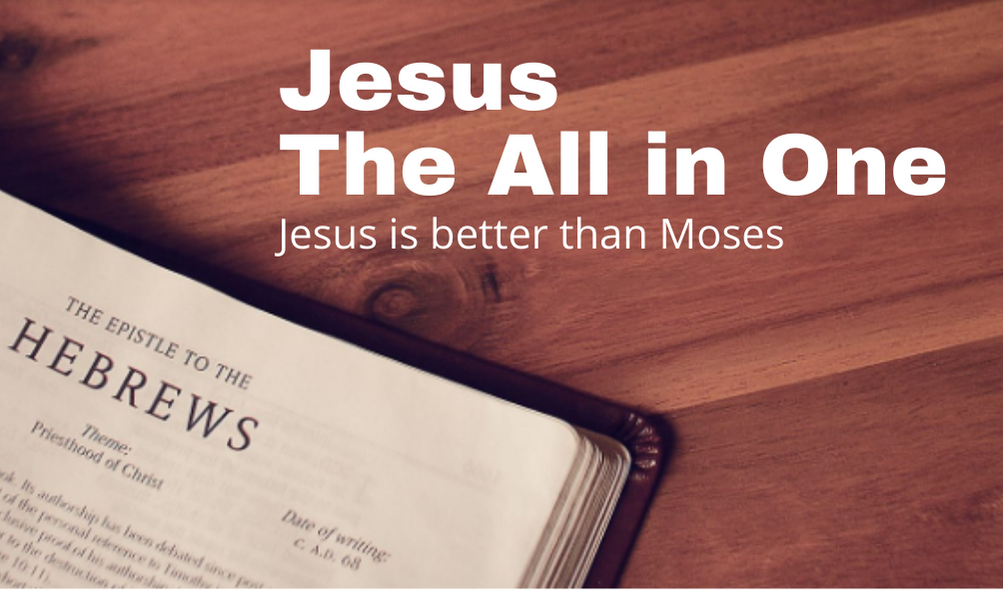May 8, 2022 Preaching | Ptr. Keith Shubert
The book of Hebrews is all about the Superiority of Jesus. The main application of the book is to press on to maturity just like Jesus who became mature through the things He suffered. The key takeaway is that – since we have such a great High Priest in Jesus, let us press on to maturity.
Recall that in Chapters 1 and 2, it was said that Jesus is better than angels, because He is God (1:5-14) and because He is human (2:5-18). The question in the minds of the 1st century church was – God gave the Law through Moses, surely Jesus is not better than Moses? Where is Jesus’ Revelation? These early Jewish Christians had these doubts because they have not seen or read the New Testament at that point in time.
In Chapter 3, the writer goes on to tell the Hebrews about the superiority of Christ, that Jesus is better than Moses. In verses 1-2, Jesus is more faithful to God the Father than Moses was. Moses was sent from the desert to the people while Jesus as an Apostle was sent from heaven to the people. While Moses was the law giver, the deliverer, the prophet, Jesus was better. Here, it’s not good versus bad but good versus best. Moses was faithful in everything that God asked him to do, but Jesus was more faithful, therefore Jesus is better than Moses.
In verses 3-4, Jesus has more glory than Moses. Yes, Moses reflected the glory of God. Because his skin shone and it was so radiant, he had to put a veil over his head so that people could talk to him. But the glory that Moses had faded over time. Jesus on the other hand was glorified in the Transfiguration when His garments became so radiant. When the voice of God said “This is my Son whom I love, listen to Him”, Moses and Elijah disappeared and Jesus was the only one left. Jesus did not reflect the glory of God, He was the glory of God, he was the radiance of God’s glory. Therefore, Jesus has more glory than Moses.
In verse 5-6, Jesus has a higher position than Moses. Moses was faithful as a servant while Jesus was faithful as a Son. Moses as a servant had no rights and no inheritance. As a Son, Jesus was the Father’s heir, essence and body. He was appointed heir of all things.
How do we now apply this? If Israel is required to obey the Revelation from Moses, then how much more should Israel obey the Revelation from Jesus, being in a higher position than Moses? In the same way, we as 21st century Christians, since we already the historical perspective and we have a deeper knowledge of who Christ is, how much more should we obey the Revelation from Jesus? What then prevents us from obeying this Revelation? There are several dangers out there that we must watch out for. Let us be aware of the danger of drifting from our Christian walk and forget these things that we know from the Word of God. Let us be aware of the danger of disobedience and the danger of carnality. We could be walking with the Lord but then we disobey. We can get things right with the Lord if we confess our sins. But if we do not confess and get things right with the Lord, then that is a dangerous state to be in as a Christian. If we choose to disobey and we do not confess our sin, we are in the danger of carnality. Let us also be aware of the danger of avoiding suffering for the cause of Christ. Lastly, we must be aware of the danger of rejecting Jesus. This can happen if we are put under pressure.
From the point of view of the 1st century Jewish Christians, we must ask ourselves the following questions – Where is our tabernacle? Where is our High Priest? Where are our priestly regulations? Why should I trust my life to someone who is inferior? Whatever it is, we must decide to follow Jesus. There is no other choice.
